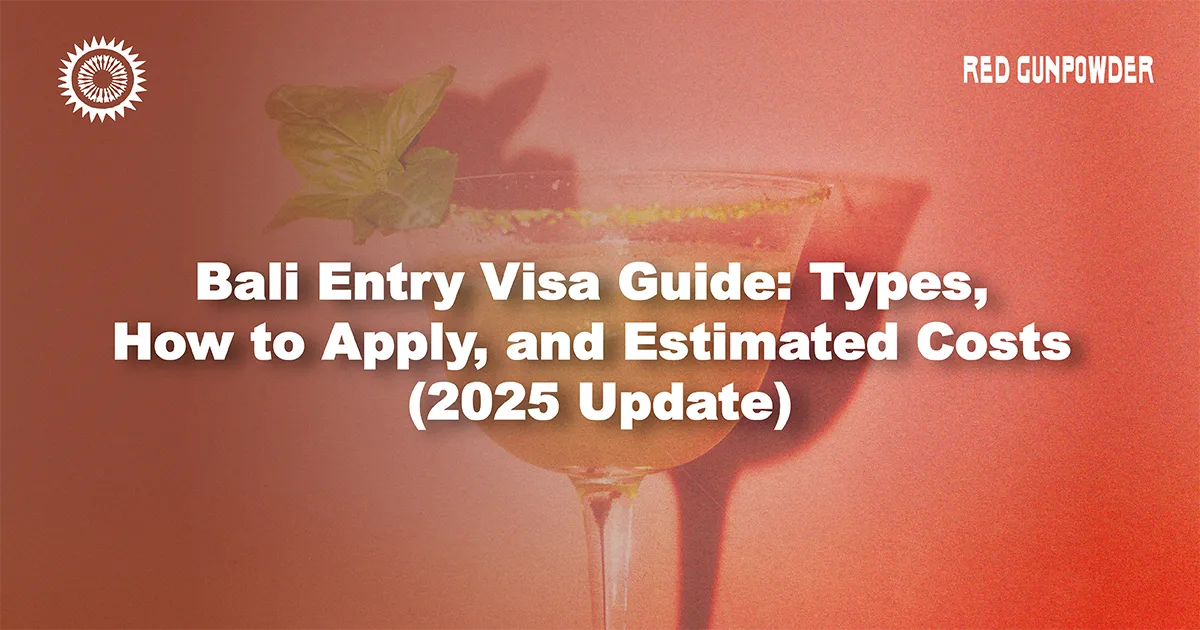One of the most important things to prepare is your visa. Indonesia has several types of visas, depending on your nationality, length of stay, and purpose of visit. This article provides a detailed overview of the visa types available for Bali visitors in 2025, how to apply for each, and the estimated costs to help you plan your trip smoothly.
Table of Contents
ToggleTypes of Visas for Bali Visitors in 2025

1. Visa-Free Entry (Visa Exemption Arrangement – VEA)
Indonesia offers a visa exemption for nationals from certain countries, primarily within the ASEAN bloc such as Singapore, Malaysia, Thailand, Brunei, and the Philippines. This visa-free entry allows tourists to visit Bali for up to 30 days without needing to apply for a visa in advance or pay any fee. It is a convenient option for short leisure trips or family visits. However, the visa-free entry cannot be extended or converted to other visa types, so travelers must leave Indonesia within the 30-day period. This makes it ideal for quick vacations or business meetings but unsuitable for longer stays. Since it is free of charge and easy to obtain, many tourists from eligible countries prefer this option, but it’s important to check Indonesia’s official updated list to confirm eligibility before booking travel.
- Duration: Visitors can stay up to 30 days without a visa.
- Extension: This visa-free entry cannot be extended or converted to another visa type.
- Purpose: Strictly for tourism or social visits only.
- Cost: Completely free.
- Who qualifies? Nationals of countries in the ASEAN bloc are eligible. Other nationalities must check Indonesia’s official list before relying on visa-free entry.
2. Visa on Arrival (VoA) & Electronic Visa on Arrival (e-VoA)
For travelers from many other countries outside ASEAN, including the United States, Australia, the United Kingdom, Canada, and most of Europe, the Visa on Arrival system is the most popular and straightforward option. Upon arrival at Ngurah Rai International Airport in Bali, visitors can pay a fee of IDR 500,000 (approximately USD 35) to receive a 30-day tourist visa stamp. The Visa on Arrival can be extended once for another 30 days by applying at the local immigration office in Bali, enabling a total stay of up to 60 days. This flexibility is useful for travelers who want to explore Bali beyond a month but don’t want the hassle of applying for a visa before arrival.
Recently, Indonesia introduced an online application for the Visa on Arrival, called the e-VoA, which allows visitors to apply and pay electronically before travel. This helps reduce waiting times at the airport and provides travelers with peace of mind. The e-VoA can be accessed through the official Indonesian immigration website. Both VoA and e-VoA require a passport valid for at least six months and proof of onward or return flight tickets.
- Duration: Allows an initial stay of 30 days.
- Extension: Can be extended once for another 30 days, giving a total of 60 days.
- Cost: The fee is IDR 500,000 (around USD 35).
- Application:
On Arrival: Pay at the airport or seaport upon entering Bali.
Online Application (e-VoA): Available through the official Indonesian immigration e-visa website evisa.imigrasi.go.id, allowing you to apply before your trip, avoid queues, and receive your visa electronically.
Important notes:
- VoA is intended for short-term tourism.
- The extension must be applied for before the initial 30 days expire.
- Passport validity must be at least 6 months.
3. Visit Visa (Visa B211A or C1)
For visitors who want to stay longer than the 60 days allowed by the Visa on Arrival, Indonesia offers the Visit Visa B211A. This visa is suitable for tourists, business visitors, social or family visits, and allows an initial stay of 60 days with the possibility of extending twice, each extension granting an additional 60 days. This means travelers can stay in Bali for up to six months legally, which is perfect for long-term tourists, digital nomads, or those visiting family and friends.
The application process for this visa is more involved than VoA. It requires applying through a registered visa agent or sponsor in Indonesia before arrival, as the visa approval letter must be issued in advance and presented at the immigration counter upon arrival. The cost is generally higher than VoA, ranging between USD 200 and USD 230 depending on agent fees and processing times. This visa offers a good balance between flexibility and length of stay but demands more preparation and paperwork.
- Duration: Issued for an initial stay of 60 days.
- Extension: Can be extended twice, each for an additional 60 days, for a total stay of up to 180 days (6 months).
- Cost: The application fee generally ranges between USD 200 to USD 230, depending on visa agents or sponsors.
- Application: Must be arranged prior to arrival in Indonesia, usually through an Indonesian visa agent or a sponsor such as a company or family member.
Who should apply?
- Those wanting to stay longer than 60 days.
- Business travelers attending meetings or conferences.
- Visitors with family or cultural/social purposes.
- How it works: You receive a visa approval letter (VOA approval) by email, which you present on arrival in Bali to receive your entry stamp.
4. Multiple Entry Visa (Visa D1)
The Multiple Entry Visa D1 is designed for frequent travelers who need to enter Indonesia repeatedly over a longer period, such as business professionals, government officials, or investors. This visa is valid for up to five years and allows multiple entries, but each visit cannot exceed 60 days. Unlike the Visit Visa B211A, the Multiple Entry Visa does not allow extensions beyond 60 days per visit.
Applicants typically need a sponsor or guarantor in Indonesia, which can be a company or an organization. This visa is ideal for people who have ongoing business or personal matters requiring frequent visits to Bali or other parts of Indonesia. Due to its extended validity, the Multiple Entry Visa simplifies travel planning, but the application process is stricter and often requires detailed documentation to prove the need for frequent entry.
- Duration: Valid for 5 years.
- Stay per Visit: Each stay is limited to 60 days maximum.
- Cost: Varies, and you typically need a sponsor in Indonesia.Application: Must be done through Indonesian immigration or via a visa agent with sponsorship.
Best for:
- Business professionals who visit Indonesia frequently.
- People with ongoing projects or family in Indonesia.
- Note: Each visit’s stay is capped at 60 days, with no extensions allowed on a single visit.
5. Limited Stay Permit (KITAS)
For foreigners planning to live, work, retire, or join family in Bali for an extended period, the Limited Stay Permit, known as KITAS, is the official long-term visa. KITAS is available in several types, including Work KITAS (for employees sponsored by an Indonesian company), Retirement KITAS (for retirees aged 55 and over who meet financial and health requirements), and Family KITAS (for dependents of KITAS holders or Indonesian citizens).
Unlike tourist visas, KITAS holders can stay in Indonesia for six months to two years and are eligible for renewal. This visa requires a sponsor and a more complex application process involving paperwork such as health certificates, police clearances, and proof of financial means. Work KITAS holders can legally work in Indonesia, while retirement KITAS holders can enjoy a peaceful life on the island with certain financial guarantees. The KITAS is suitable for expatriates, long-term residents, and retirees who want to settle in Bali without constant visa renewals. Because of the complexity and cost involved, applicants often use immigration consultants or agents to facilitate the process.
- Duration: Valid for 6 months to 2 years, renewable.
- Types:
– Work KITAS: For employees sponsored by an Indonesian company.
– Retirement KITAS: For retirees aged 55+ with proof of pension or income.
– Family KITAS: For family members of KITAS holders or Indonesian citizens.
– Cost: Varies widely depending on visa type and agent fees. - Application: Requires sponsorship (by employer, family, or agency) and pre-approval from immigration authorities.
Important:
- KITAS holders can work (if work KITAS) and stay long-term.
- Application is more complex and takes longer than tourist visas.
- KITAS card holders must report to immigration regularly.
Read also: Can Foreigners Own Property in Bali? Here’s Everything You Need to Know
How to Apply for a Bali Visa: Step-by-Step
1. Visa on Arrival (VoA) or e-VoA
On Arrival:
- Fill out arrival card.
- Pay the visa fee (IDR 500,000 or around $35 USD).
- Receive the stamp allowing 30 days entry.
Online e-VoA:
- Visit eVisa official website.
- Register and fill out application.
- Upload passport scan and photo.
- Pay online.
- Receive e-VoA approval letter by email.
- Present e-VoA at arrival to get entry stamp.
2. Visit Visa B211A (60-day stay, extendable)
- Find a reliable visa agent or Indonesian sponsor.
- Submit passport copies, photo, itinerary, and other required documents.
- Agent submits application to immigration in Indonesia.
- Receive visa approval letter via email.
- Present approval letter on arrival to get visa stamp.
- Apply for extensions at local immigration office in Bali before expiration.
3. Multiple Entry Visa (D1)
- Obtain Indonesian sponsor.
- Apply via immigration or visa agent.
- Provide required documents and fees.
- Await approval.
- Receive multiple entry visa electronically or as a stamp on arrival.
4. KITAS Long-Term Visa
- Secure sponsor (employer, family, retirement agent).
- Prepare supporting documents (health insurance, police clearance, sponsor letters).
- Submit application via immigration or agent.
- Attend biometric and medical checks.
- Receive KITAS card and allow long-term stay.
Additional Tips for Bali Visa Applicants
- Passport Validity: Your passport must be valid for at least 6 months from the date of arrival.
- Return Ticket: Indonesian immigration often requires proof of onward or return travel.
- Health Protocols: Check current health regulations related to COVID-19 or other requirements.
- Tourist Levy: Bali has implemented a tourist tax of IDR 150,000 (~$10) to support environmental efforts, payable online or at the airport.
- Visa Agents: For longer visas like B211A or KITAS, it is highly recommended to work with a reputable visa agent to navigate the paperwork and approvals efficiently.
- Keep Copies: Always keep copies of your visa approval letter and extension receipts with you during your stay.
Read also: Determining Best Months to Visit Bali : All You Need to Know
Plan Ahead for a Smooth Arrival in Bali
Choosing the right visa for your trip to Bali depends on your nationality, the length of your stay, and the purpose of your visit. Whether you’re planning a short tropical escape, an extended stay for business or leisure, or even considering retiring in paradise, Indonesia offers a range of visa options to suit different travel needs. It’s important to stay updated through the official Indonesian immigration e-visa portal and, when needed, work with a reliable visa agent to ensure a smooth application process. Prepare your documents early, understand the costs, and enjoy the magical island of Bali with peace of mind!






